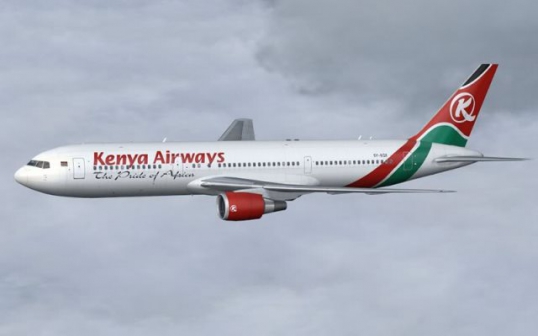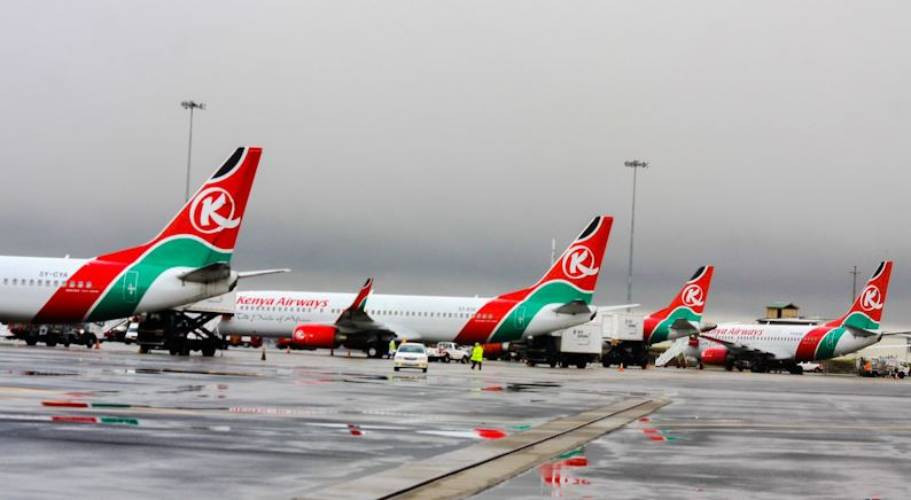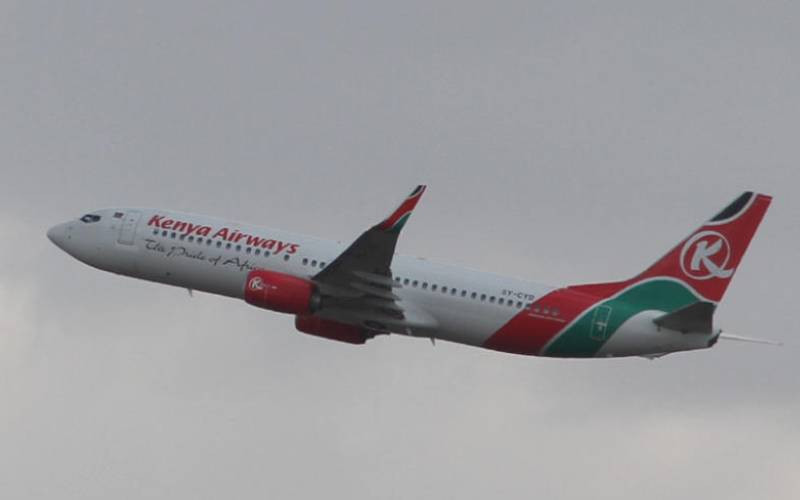
Today, The Standard on Sunday exposes how Kenya Airways shed off the “Pride of Africa” tag in a highly publicised Joint Venture agreement.
It came as a huge shock when the national carrier nosedived from its profit making territory and sunk deep into losses.
In 1995, the Kenya government signed a negotiated five-year master agreement with Dutch airline (KLM) that would see the latter acquire a 26 per cent stake in KQ.
The deal, it was hoped, would facilitate expansion of the national carrier and also return value to KLM.
After the five-year initial period, the deal mutated into a 10-year strategic plan between KQ and KLM. The plan spelt out the routes the airlines would fly, the fleet size, type and the range to be covered.
To align with the agreement, Kenya Airways had to revise its Memorandum and Articles of Association. Legal and aviation experts say this is the point at which KQ began the steady slide into technical insolvency. By the stroke of a pen, the Kenya Government and other shareholders lost all substantive commercial and administrative control of the national carrier to KLM.
Economists and commercial law experts say the agreement as drafted is at absolute variance with what the joint venture agreement aimed to achieve.
Specifically, the revision of the KQ memorandum and articles was effected by introducing a new clause 115 which reads in part: “If and for so long as the cooperation agreement shall remain in force, any resolutions relating to any of the following matters shall be deemed not to have been passed if any KLM Director (or his alternate) is against the proposed resolution.”
It is this amendment that has led economic experts to conclude the entire arrangement was outrageous while commercial law experts have called it a takeover.
The agreement as it exists now gives KLM absolute control of any sale of shares by the Government of Kenya acting through the Permanent Secretary to the Treasury to a major international airline; any delegation by the directors of any of their powers to a committee of the board or to any manager; and the appointment or dismissal of the managing director or finance director of Kenya Airways.
Other matters where KLM acquired absolute and unchecked control include disposal of any aircraft and any other variations in the size and composition of the company’s fleet.
The Dutch airline also had to approve any cooperation agreement with an airline that is a major competitor of KLM, alteration of routes and commitment or expenditure on sales and marketing or distribution of Kenya Airway’s products and services.
These restrictive resolutions were adopted in a shareholders’ meeting and a board forum where the tax payer was represented by at least two principal secretaries (Transport and National Treasury).
Consequently, the amendments were effected in September 2013.
Stay informed. Subscribe to our newsletter
Legal commercial expert Mbugua Ng’ang’a described the move as one that technically auctioned Kenya Airways.
“When one partner in a joint venture agreement enjoys a veto on all substantial commercial and administrative decisions and especially where that partner is also a competitor then that is a takeover, it cannot be an agreement. This so-called agreement technically rendered Kenya Airways a subsidiary of KLM. Plainly told, Kenya Airways was literally auctioned. Somebody here or a group of people belong to jail,” he said.
Mr Mbugua further said the resolution points to professional negligence. “It is unbelievable that Kenyans were busy hoping for a better national carrier while others were busy auctioning it. The law is very clear on the role of board members,” he said.
Economic expert Aly-Khan Satchu has described the agreement as outrageous.
Satchu said: “KLM has an apparent position of control and this signals that perhaps at the time we did not have a strong hand and evidently we played it poorly.
“Kenya Airways needs to take control of its future and it probably starts with taking a cold hard look at its relationship with KLM,” said Satchu.
Serious questions have emerged about how this escaped the attention of the Capital Markets Authority (CMA) that has the constitutional duty to protect investors.
A senior manager at Kenya Airways who did not want to be named because of the sensitivity of the matter said the national carrier had “lost it”.
“If you want to know just how deep KQ has sunk, you only need to check the situation around ticketing and management of the company vis-a-vis KQ’s best interest. I have no doubt that any attempt to revive Kenya Airways within the context of the existing joint venture arrangement will fail because it amounts to throwing good money after bad. The agreement as drafted could not have promoted the success of KQ. It set the stage for the company’s slide into insolvency,” he said.
Legal experts have also questioned the validity of the ten-year strategic plan between KQ and KLM on the basis that the signatories were technically representing only one party to the deal.
“Both the managing director then and his financial director who signed the agreement with KLM on behalf of Kenya Airways were themselves technically KLM employees. They owe all their allegiance to KLM because their discretion to make decisions is fettered by the interest of the employer. One would therefore even argue that KLM signed this agreement with her own employees,” said Mbugua
The chairman of the Kenya Airways Board of directors, Amb Dennis Awori, declined to comment on the matter saying,”I am currently traveling around the region and will be available to talk to you late next week.”
KQ Chief Executive Mbuvi Ngunze, Transport CS James Macharia, National Treasury CS Henry Rotich and Capital Markets Authority boss Paul Muthaura also declined to comment on the matter.
 The Standard Group Plc is a
multi-media organization with investments in media platforms spanning newspaper
print operations, television, radio broadcasting, digital and online services. The
Standard Group is recognized as a leading multi-media house in Kenya with a key
influence in matters of national and international interest.
The Standard Group Plc is a
multi-media organization with investments in media platforms spanning newspaper
print operations, television, radio broadcasting, digital and online services. The
Standard Group is recognized as a leading multi-media house in Kenya with a key
influence in matters of national and international interest.
 The Standard Group Plc is a
multi-media organization with investments in media platforms spanning newspaper
print operations, television, radio broadcasting, digital and online services. The
Standard Group is recognized as a leading multi-media house in Kenya with a key
influence in matters of national and international interest.
The Standard Group Plc is a
multi-media organization with investments in media platforms spanning newspaper
print operations, television, radio broadcasting, digital and online services. The
Standard Group is recognized as a leading multi-media house in Kenya with a key
influence in matters of national and international interest.









